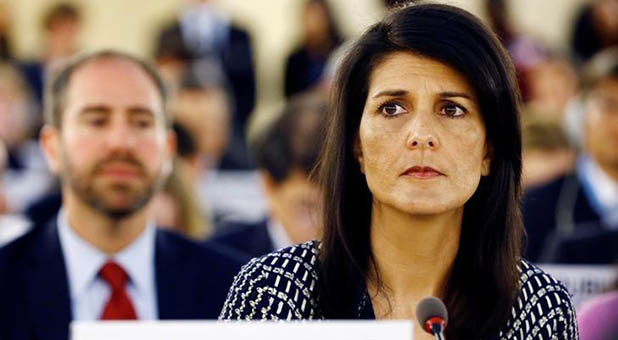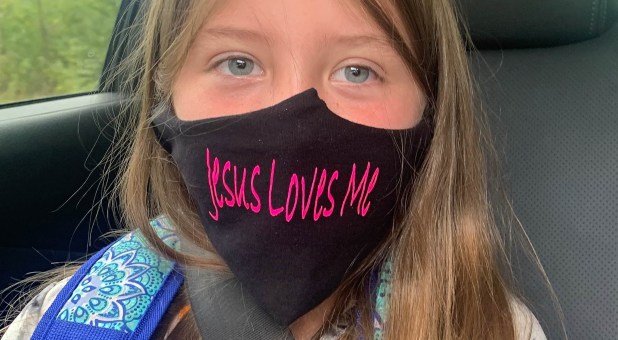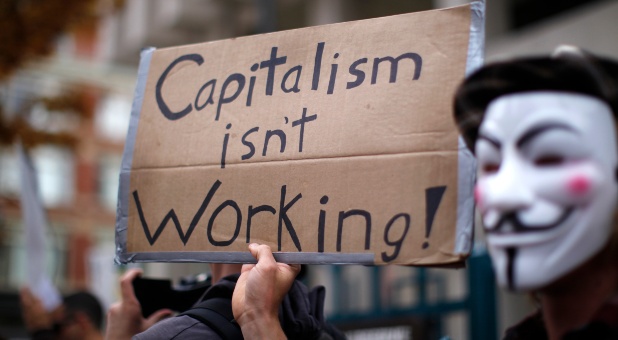During a speech Tuesday about the U.S. commitment to protecting human rights to the United Nations Human Rights Council in Geneva, Switzerland, U.S. Permanent Representative to the U.N. Ambassador Nikki Haley ripped the world body for its blatant anti-Israel bias.
“There is no room here for cultural relativism,” she said. “This Human Rights Council must adopt strong resolutions condemning violence and discrimination against women and it must take a decisive action to eliminate trafficking.
“I’m proud that the United States is hosting a side-event on the rapidly deteriorating human rights situation in Venezuela today. I’ll be there—and I hope you’ll be with me—to hear first-hand about the serious human rights violations there.
“The council must address this issue. If Venezuela cannot, it should voluntarily step down from its seat on the Human Rights Council until it can get its own house in order. Being a member of this Council is a privilege, and no country who is a human rights violator should be allowed a seat at the table.
“Finally, it’s hard to accept that this council has never considered a resolution on Venezuela, and yet it adopted five biased resolutions in March against a single country, Israel. It is essential that this council address its chronic anti-Israel bias, if it is to have any credibility.”
You can see that speech in the video clip above. But she was far from done. Later in the day, she addressed the issue of Venezuela directly in another speech:
For those with roots in Venezuela, in many cases it takes tremendous bravery to speak out against what is happening there today. We are very grateful for your voices.
Charles Malik, one of the earliest advocates of human rights at the United Nations, understood both the moral and the security dimensions to human rights. To him, anyone concerned about peace and security had to be concerned with human dignity.
Malik said, “There is a peace that only cloaks terrible inner conflicts; and there is a security that is utterly insecure.” It seems to me this is a snapshot of a description of Venezuela.
For years, what has passed for “peace” in Venezuela has masked horrendous inner suffering. Venezuela’s security has been utterly insecure because it has been purchased with the human rights and self-determination of its people.
Today we are seeing the inevitable result. Starving and repressed citizens have taken to the streets, and the Maduro regime is responding with violence.
The situation is so serious that the Security Council met in May to do something it doesn’t usually do: put the spotlight on human rights violations, and in this case, Venezuela.
I pushed for the meeting because I agree with Malik: There is no greater indicator of impending conflict and instability than a regime that fails to uphold the most basic human rights of people.
Some of my colleagues in New York disagreed with me. They argued that the Security Council is a place to consider peace and security, not human rights. I completely disagree.
Human rights should be considered in every U.N. forum. But regardless of whether one agrees that the Security Council is the right place to discuss human rights in Venezuela, no one can disagree that the Human Rights Council is a fitting place for this discussion.
The Venezuelan government is in the midst of destroying human rights and democracy in Venezuela. It is conducting a campaign of violence and intimidation against unarmed demonstrators, businesses, civil society, and freely elected political opposition.
Since April, when demonstrations became a daily occurrence, more than 60 people have been killed. More than 1,000 have been injured and nearly 3,000 have been detained, including over 300 civilians who are being charged criminally in military courts.
Instead of respecting the authority of the Venezuelan National Assembly—that is, respecting democracy—President Maduro has called for a constitutional assembly. It will supposedly be tasked with rewriting the constitution to calm anti-government protests and pave the way for regional elections. But the Venezuelan regime is fooling no one. Recognizing that its grip on power has slipped, it is trying to yet again change the rules of the game to maintain its power, privileges, and protections.
Most recently, Maduro has begun the process of withdrawing from the Organization of American States, turning his back on the principles of democracy and self-determination in the Inter-American Democratic Charter. And the government continues to hold opposition leader Leopoldo Lopez and many others in prison, in violation of the rule of law and freedom of expression.
Over the course of years, President Maduro has tightened his grip on Venezuela, turning the formerly prosperous democratic nation into a rusting dictatorship. His actions have not just been crimes against Venezuela’s economic and political institutions. The Maduro regime has purposefully starved and deliberately hurt its own people.
No story better illustrates the results of the campaign to deny the basic human dignity of the Venezuelan people than the story of Ashley Pacheco, as reported by the Associated Press. She was 3 years old when she fell and scraped her knee in Caracas. It was a typical childhood injury. But when her leg began to swell and she developed a fever, her parents tried to take her to the hospital. As her fever rose, they tried three different facilities. But an estimated 98 percent of medical supplies and 85 percent of drugs are not available. Short on supplies, doctors and beds, no hospital could take Ashley.
By the time her leg had swollen from her toes to the top of her thigh, they found a hospital that could take her. Some patients had to share beds and stray dogs wandered the halls, but Ashley was lucky to be admitted.
The doctors diagnosed a staph infection. Ashley desperately needed antibiotics. But the hospital’s supply was gone, and the Maduro regime has refused to allow humanitarian aid. So her family was forced to search hospitals, pharmacies and black markets throughout Caracas for these lifesaving drugs. When Ashley’s swollen leg reached the diameter of a dinner plate, the doctors said she needed surgery. Only two of the hospital’s 27 operating rooms were functional; 150 children were waiting for surgery. For two days, Ashley’s mother was forced to deprive her 3-year-old of food and drink to keep her stomach empty in case an operating room opened up.
Before she left the hospital, Ashley developed two more life-threatening infections. Each time, her parents had to desperately search for the medicine she needed, maxing out their credit cards and selling their belongings. To treat her final infection, they found medicine through tragedy. The boy in the room next door had died from the same infection. His mother donated his unused medicine to Ashley.
Ashley eventually got out of the hospital. Her heart is scarred from the infection, and she will need further surgery to avoid congestive heart failure, but she is one of the lucky ones. She lived.
Others are not so lucky. In the last year, 11,500 babies died before their first birthday in Venezuela. Maternal mortality is up 65 percent. Seventy-five percent of Venezuelans have lost an average of 19 pounds from food shortages.
This is an economic, political and humanitarian crisis that demands the world’s attention. But let there be no mistake: There is only one party responsible for the crisis in Venezuela. One group of officials is responsible for taking one of the richest countries in Latin America and making it a place where mothers dig through trash cans to feed their families. One government is responsible for transforming a model health care system into one in which children are lucky to escape death from scraped knees.
Not surprisingly, the Maduro regime is desperate to hide its abuses from the world. It confiscates the passports of opposition politicians. It sows fear among Venezuelans who travel abroad not to tell their stories—stories like Ashley’s—to the world.
Tragically, the Maduro regime’s effort to silence its critics reaches all the way here, to Geneva, and into the Human Rights Council.
Here, at the world’s preeminent human rights organization, Venezuela is a member in good standing. And it uses that membership to block any meaningful discussion of its human rights violations. The Human Rights Council has no excuse. It cannot consider itself the world’s leading human rights organization and continue to ignore the violations and abuses that are occurring in Venezuela.
Those who cannot defend themselves turn to this Council for hope and for justice. If they continue to be met with indifference and inaction it will harm not just the reputation of the Council but the very idea that nations can cooperate to protect human dignity.
Governments throughout the Western hemisphere, the EU and the Vatican have expressed their grave concerns about the situation of the Venezuelan people. There is genuine willingness among Venezuela’s neighbors to assist in finding a peaceful, democratic solution. The Human Rights Council must add its voice to this effort.
An organization dedicated solely to human rights was created in the U.N. Charter because men and women like Charles Malik believed that the protection of human rights would lead to a better and more peaceful world. And working alongside Malik in those early days were delegates from Latin America. They were pioneering internationalists, committed to the true spirit of Simon Bolivar. The document they produced, the 1948 American Declaration of Rights and Duties, formed the basis for much of the United Nations Universal Declaration of Human Rights.
This is a history we all share. It is a vision we have all committed ourselves to. But fancy words and lofty sentiments mean little to people who are hungry and suffering.
We have come here today to call the international community’s attention to Venezuela’s violations of international human rights agreements. My hope is that we leave with a greater commitment to the men, women, and children these agreements are meant to protect.
There are many things that could be done to help the people of Venezuela. But they really only need one thing: a free election.
Venezuela has democratic traditions. If those traditions were honored, the Venezuelan people would save themselves. They know what needs to be done.
It is our job to assist in paving the way toward giving the Venezuelan people back their rights, their dignity and their prosperity.
You can see that speech in the video clip below. But Haley still wasn’t done. A short time later, she gave a third speech, this time on the future role of the U.S. in the cause of protecting and advancing human rights around the world.
She said, in part (click here to watch the whole speech):
America does not seek to leave the Human Rights Council. We seek to reestablish the council’s legitimacy.
There are a couple of critically necessary changes.
First, the U.N. must act to keep the worst human rights abusers from obtaining seats on the council. As it stands, elections for membership to the council are over before the voting even begins. Regional blocs nominate slates of predetermined candidates that never face any competition for votes.
No competition means no scrutiny of candidates’ human rights records. We must change the elections so countries are forced to make the case for membership based on their records, not on their promises.
Selection of members must occur out in the open for all to see. The secret ballot must be replaced with open voting. Countries that are willing to support human rights violators to serve on the Human Rights Council must be willing to show their faces. They know who they are. It’s time for the world to know who they are.
Second, the Council’s Agenda Item Seven must be removed. This, of course, is the scandalous provision that singles out Israel for automatic criticism. There is no legitimate human rights reason for this agenda item to exist. It is the central flaw that turns the Human Rights Council from an organization that can be a force for universal good, into an organization that is overwhelmed by a political agenda.
Since its creation, the council has passed more than 70 resolutions targeting Israel. It has passed just seven on Iran. This relentless, pathological campaign against a country that actually has a strong human rights record makes a mockery not of Israel, but of the Council itself.
The council’s effort to create a database designed to shame companies for doing business in Israeli-controlled areas is just the latest in this long line of shameful actions.
Blacklisting companies without even looking at their employment practices or their contributions to local empowerment, but rather based entirely on their location in areas of conflict is contrary to the laws of international trade and to any reasonable definition of human rights. It is an attempt to provide an international stamp of approval to the anti-Semitic BDS movement. It must be rejected.
Getting rid of Agenda Item Seven would not give Israel preferential treatment. Claims against Israel could still be brought under Agenda Item Four, just as claims can be brought there against any other country. Rather, removal of Item Seven would put all countries on equal footing.
The council is no more justified in having a separate agenda item on Israel than it is on having one for the United States, or Canada, or France or the United Kingdom. More appropriate would be to have an agenda item on North Korea, Iran and Syria, the world’s leading violators of human rights.
These changes are the minimum necessary to resuscitate the council as a respected advocate of universal human rights.
For our part, the United States will not sit quietly while this body, supposedly dedicated to human rights, continues to damage the cause of human rights.
In the end, no speech and no structural reforms will save the members of the Human Rights Council from themselves. If they continue to put politics ahead of human rights, they will continue to damage the cause that they supposedly serve.
All those years ago, Mrs. Roosevelt understood this. She was engaged in building an institution to bring the nations of the world together to protect the most vulnerable. But she knew the good she was seeking would not come from that institution, but from the hearts of men and women who would work in it. Every night, she prayed: “Save us from ourselves and show us a vision of a world made new.”
I believe that vision is still achievable. I believe we can come together. I know there are many who share the belief.
The status quo is not acceptable. It is not a place for countries who champion human rights.
I call on all like-minded countries to join in making the Human Rights Council reach its intended purpose.
Let the world be on notice: We will never give up the cause of universal human rights. Whether it’s here, or in other venues, we will continue this fight.
{eoa}
See an error in this article?
To contact us or to submit an article




















